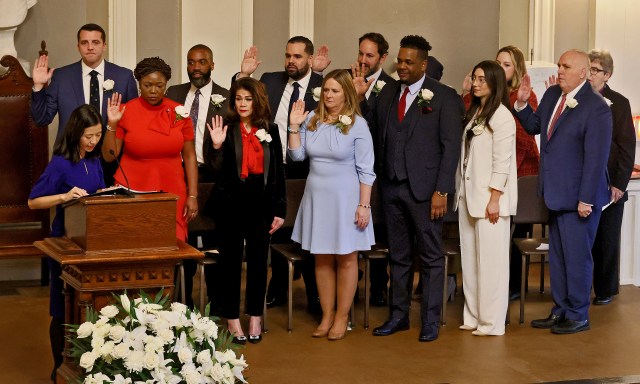
Boston city councilors are expressing dissatisfaction with the requirement to work on New Year’s Day and are pushing for a modification to the city charter to avoid scheduling mayoral and council inaugurations on federal holidays.
Councilor Gabriela Coletta, who heads the government operations committee, is proposing that the council vote positively on a home rule petition this Wednesday. This petition aims to adjust the city charter by shifting the inauguration date from the first Monday of January to the first weekday following Jan. 2.
If this proposal is accepted, Mayor Michelle Wu must endorse the petition before it can be presented to state legislators on Beacon Hill. State approval is necessary to implement a charter amendment that would also adjust the conclusion of mayoral and council terms accordingly.
The primary goal of this initiative is to ensure that Boston city employees are not compelled to work on the federally recognized holiday of New Year’s Day simply to participate in and facilitate city council and mayoral inaugurations, marking the beginning of the municipal year, as outlined by Coletta in a committee report.
The petition docket, initiated by Council Vice President Brian Worrell, evoked laughter during a City Council meeting on Jan. 24 when City Clerk Alex Geourntas read it aloud. Council President Ruthzee Louijeune remarked on the amusement, hinting at the challenges posed by late-night New Year’s Eve celebrations followed by an early 10 a.m. inauguration, where the 13 newly elected councilors were sworn in.
Furthermore, a brief City Council session took place at noon on New Year’s Day, during which Louijeune was elected as the new president of the council.
Worrell, in a statement to the Herald on Monday, highlighted the strain placed on the city’s public safety personnel due to the rapid turnaround required for the inauguration following New Year’s Eve festivities. He emphasized the importance of addressing this issue promptly to alleviate the burden on public safety officers and enhance civic engagement.
The proposed change aligns the inauguration dates more closely with federal standards, ensuring that they fall between Jan. 3-5, in line with Congress’ inauguration on Jan. 3 to avoid coinciding with New Year’s Day or its observed holiday.
Louijeune also expressed support for the measure, acknowledging the challenges faced by council staff working on the holiday and the subsequent compensation provided.
While the tradition of inauguration on New Year’s Day is common, not unique to Boston, the petition seeks to refine the city charter’s inauguration dates, municipal years, and elected terms to promote efficiency and alignment with federal practices.
If approved locally and at the state level, the proposed changes would come into effect starting with the elected terms and the municipal year commencing on Jan. 5, 2026.
Although ten councilors endorsed Worrell’s petition upon its introduction in late January, two councilors, Ed Flynn and Erin Murphy, did not. Both Flynn and Murphy expressed their intention to vote against the proposal, citing their commitment to serving the public even on holidays.
Flynn emphasized his dedication to serving as a city councilor, while Murphy highlighted the convenience of holding the ceremony on a federal holiday for increased participation without necessitating time off work for attendees.
Murphy questioned the necessity of amending the city charter, emphasizing the infrequency of inaugurations coinciding with federal holidays. She expressed opposition to the proposed change if it is primarily motivated by the impact of New Year’s Eve celebrations on the inauguration schedule.
